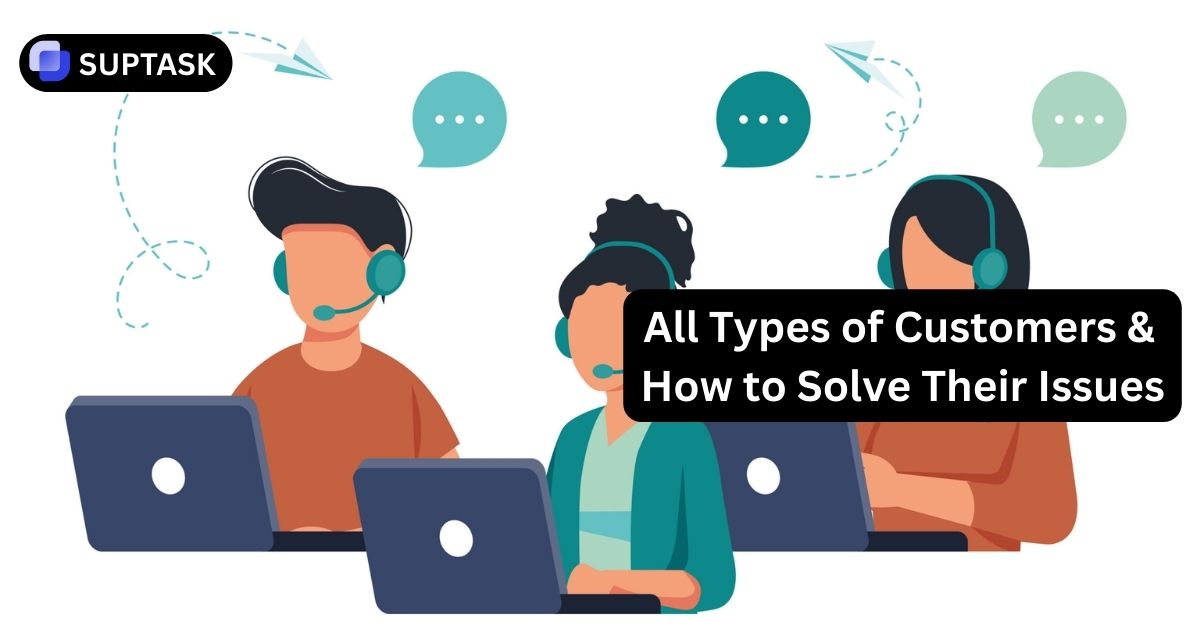Building great customer relationships is critical for long-term business success. Businesses may build loyal clients by developing trust, recognizing needs, and providing personalized experiences.
This article delves into ten tried-and-true tactics for strengthening customer relationships, increasing satisfaction, and making your brand stand out in today's competitive economy.
Key Takeaways
- Customer relations focus on proactive strategies to build connections; customer service addresses immediate issues.
- Solid customer relationships boost loyalty, reputation, and retention while reducing costs significantly.
- Leveraging CRM systems and self-service tools improves customer interactions and ensures consistent touchpoint experiences.
Understanding Customer Relations vs. Customer Service

Customer relations managers employ strategies and methods designed to nurture and sustain continuous customer relationships.
They concentrate on forging robust client engagements, ensuring these interactions maintain uniformity throughout all contact points.
Their proactive tactics seek to deliver an uninterrupted, affirmative experience that meets or surpasses customer expectations.
Conversely, customer service is primarily concerned with responding to customer questions and resolving problems when they occur, emphasizing prompt solutions.
Recognizing the distinction between these two facets is critical for businesses as it enables them to craft more complete approaches to boost customer satisfaction and loyalty.
Customer Service: The Reactive Approach
The customer service team is critical in guaranteeing client satisfaction by resolving concerns and establishing good interactions.
Their primary issue is to provide quick and practical answers, which is critical for customer satisfaction.
First-call resolution (FCR) is an important metric or the rate at which issues are handled at the initial engagement.
Improving FCR increases satisfaction and team efficiency. Finally, good customer service depends on meeting or exceeding expectations through timely, knowledgeable help, ensuring exceptional experiences at every point of the customer journey.
Customer Relations: The Proactive Methodology
In customer relations, a proactive approach is vital. It encompasses resolving immediate concerns and continuous engagement with customers to elevate their overall experience.
The goal here is to forge valuable relationships beyond the initial transaction by predicting what customers might need in the future, offering pertinent information and insights, and encouraging loyalty through various programs and incentives.
Strategies rooted in robust customer relations prioritize enduring loyalty and favorable client experiences.
Such practices are instrumental in bolstering customer retention rates. When businesses dedicate themselves to forward-thinking customer relations efforts, they lay a foundation of trust that paves the way for profound and sustainable relationships with their clientele.
Benefits of Strong Customer Relationships
.webp)
Fostering good customer connections has various benefits, including increased retention, brand loyalty, and repeat sales.
These relationships improve the customer experience while lowering the cost of gaining new consumers.
Companies prioritizing strong relationships typically have larger profit margins and a competitive market advantage.
Maintaining existing clients is also more cost-effective than acquiring new ones, resulting in significant savings and long-term profitability.
Increased Customer Loyalty
Fostering customer loyalty by delivering positive experiences makes it difficult for competitors to attract your customers.
Building strong relations with them promotes retention and the likelihood of repeat purchases, boosting a business's longevity.
Understanding what is customer feedback and acting upon it, along with expressing gratitude through tailored loyalty initiatives or personal acknowledgments, can strengthen customer loyalty.
Providing loyal customers with discounts, unique promotions, or rewards programs helps maintain their patronage and surpasses their expectations, enriching their association with your brand and deepening their commitment.
Solidifying these relationships is key to reducing expensive turnover rates among clients and underpinning a business's enduring success.
Enhanced Brand Reputation
Maintaining positive customer relations is crucial for a company’s brand image and trustworthiness.
When customers have affirmative engagements with the brand, it bolsters the company’s standing in the marketplace.
By personifying the company with human characteristics, customers are more likely to form a connection with the brand, which can drive repeat business.
Companies that make it their mission to provide consistently excellent and memorable customer experiences gain recognition and referrals, thus amplifying their reputation.
Such an enduring cycle of reliability and esteem often results in higher rates of new leads acquisition and customer retention.
Cost Savings Through Retention
Maintaining relationships with current customers typically incurs lower costs than acquiring new clientele, resulting in notable financial savings for companies.
Allocating resources towards fostering positive customer relations may require greater upfront investment, yet it yields steady income streams due to heightened loyalty, which bolsters customer lifetime value and facilitates stable pricing.
Strong customer relationships facilitate monetary conservation and amplify sales volumes. The economic efficiency gained from nurturing solid customer connections is a powerful motivator for businesses to prioritize sustaining favorable customer interactions.
Leveraging Technology for Better Customer Relations

In the current era, where digital technology plays a pivotal role, it’s essential to utilize such advancements to improve customer interactions and fortify relationships.
CRM (Customer Relationship Management) systems, automated self-service options, and multi-channel communication strategies can significantly enhance customer relations.
They assist in organizing client data effectively, simplifying exchanges with customers, and delivering uniform service experiences at each point of contact.
Suptask is an example of one of these innovative tools. It enhances customer service by incorporating ticketing within Slack channels.
This integration boosts operational efficiency while guaranteeing quick and adept resolution of any customer issues or queries through help desk ticketing.
CRM Systems
CRM platforms enable companies to scrutinize customer engagements and information at every customer journey stage.
These indispensable systems facilitate effective consumer data management and exchanges, guaranteeing uniformity across all client contact points and corresponding to business objectives.
These systems can pinpoint specific trends and sectors needing focused enhancement efforts to foster more tailored customer interactions.
Employing CRM tools amplifies the quality of the client experience by boosting contentment and fidelity among patrons.
The valuable intelligence gathered from these systems aids in shaping corporate tactics while promoting advancements in how businesses interact with their clientele.
Self-Service Tools
Tools such as FAQs and knowledge bases that facilitate self-service provide customers with a speedy and efficient means to obtain information, thereby boosting their overall contentment.
These instruments allow users to tap into answers and remedies without needing external support, which can amplify their user experience.
When customers are empowered to tackle issues swiftly through self-service, it contributes positively to the service encounter and customer loyalty.
Offering options for self-service enhances client satisfaction and decreases the demands placed upon our customer service team.
This reduction allows them to devote more attention to more intricate matters, which improves efficiency and effectiveness within customer service operations.
Omnichannel Communication
Ensuring consistency in customer interactions across various communication platforms is pivotal for an omnichannel approach.
Engaging with customers on the channels they prefer increases their satisfaction and involvement.
This strategy promotes uninterrupted switching between different mediums, offering a unified and comprehensive service experience.
Adopting omnichannel support can boost customer loyalty and contentment by guaranteeing that the quality of attention and service remains consistent no matter which platform customers choose.
10 Ways to Improve Customer Relations

Enhancing customer relationships is an active endeavor to gain insight into and align with customers' needs.
By embracing these ten concrete strategies, from appreciating customer values to adapting based on their feedback, you will be equipped to cultivate robust, enduring connections that foster customer loyalty and contentment.
1. Understand What Your Customers Value
Understanding what customers value is crucial for businesses in customizing their services and improving customer satisfaction.
It’s imperative to pinpoint precisely what consumers deem valuable, which forms the cornerstone of devising potent marketing tactics.
To fully comprehend customers' values, it is necessary to engage attentively with their feedback and modify offerings accordingly to meet their expectations.
The elements that affect a customer’s perception of value encompass the quality of products, the prestige associated with a brand, and excellence in service provision.
Comprehending why clients are drawn to certain brands sheds light on pivotal value propositions that appeal most effectively to them.
By focusing on these aspects, enterprises can more successfully attract new patrons while ensuring the loyalty of existing ones.
2. Show Genuine Care and Empathy
Showing genuine empathy when dealing with customers can significantly increase their loyalty. A sincere interest in the welfare of a customer strengthens that loyalty and improves overall satisfaction.
When customer service agents display empathy, they cultivate trust, which is essential for sustaining lasting relationships and shaping the future of customer service.
Recognizing how customers feel when they voice grievances can turn challenging encounters into chances to strengthen those bonds.
Employing language filled with empathy underscores customers' perceptions that their concerns are acknowledged and appreciated.
Taking steps to check in after providing service shows a continuous dedication and effort to address any issues faced by the customer, reinforcing an essential aspect of solidifying robust customer relationships.
3. Adapt to Their Communication Style and Pace
Aligning communication approaches with customer inclinations can elevate the quality of interactions.
By modifying your style and pace to suit a customer’s preferences, you not only bolster rapport but also minimize potential misinterpretations, thereby fortifying the relationship.
To establish an effective connection, it is critical to synchronize your tone, choice of words, and manner of speech with the customer’s disposition and character.
Selecting an appropriate medium for communication—like phone or email—plays a pivotal role in adeptly adapting to each customer's individualized style.
4. Let Your Brand Values Guide Every Interaction
Maintaining a solid foundation of brand values in all customer engagements builds trust and fosters a sense of connection.
By ensuring each interaction reflects the core values, businesses make their customers feel appreciated and understood, promoting loyalty and encouraging them to advocate for the brand.
Customers gravitate towards forthright and clear brands about their business practices and societal contributions.
When a company conveys its brand values, it stands out in a saturated marketplace, attracting consumers more likely to engage with the business.
5. Model the Behavior You Want to See from Your Team
Leaders who model the behaviors they wish to see can motivate their customer service team members to act similarly.
How leaders engage with others and handle situations establishes a benchmark for team interactions, aligning with emerging customer experience trends and significantly shaping the overall experience.
Employees tend to mirror their superiors’ actions because they pay close attention to how those in leadership roles behave.
How a leader reacts when faced with issues in providing service sets an example for employees in managing comparable scenarios.
Effectively demonstrating ideal behavior in customer service also involves consistently acknowledging employees who demonstrate actions that prioritize customers' needs.
6. Focus on Building Relationships Over Time
Developing strong customer relationships holds more value than simply pursuing immediate sales gains.
Establishing such relationships is critical for sustained business success, as they lead to increased trust and heightened loyalty among consumers.
When customers develop an emotional bond with a brand, their likelihood of remaining with it rises significantly.
By engaging with customers via interactive methods like quizzes and surveys, businesses can enhance loyalty and strengthen their bonds.
Concentrating on retaining current customers rather than investing resources into attracting new ones is economically advantageous for companies since retention often results in greater profit margins.
Cultivating profound connections with clients paves the way for these individuals to become advocates for your brand, thereby organically extending its reach through word-of-mouth marketing.
This strategy ultimately helps create a mutually beneficial relationship between the customer and the business.
7. Be Transparent and Honest
Maintaining openness in transactions is essential for bolstering the trust and loyalty of customers.
When a company actively communicates about its operations, it cultivates trust and solidifies consumer bonds.
Brands that provide clear information regarding their activities are more likely to gain consumer confidence, resulting in heightened trustworthiness and loyalty.
Companies must be forthright with their customers regarding operational procedures and data management, which is pivotal in establishing enduring relationships.
By embracing transparent communication, businesses can minimize customer turnover while reinforcing brand devotion.
This clarity dispels any uncertainties harbored by consumers, improving satisfaction levels and encouraging greater engagement with the brand.
8. Invest in Training and Empowering Your Team
Regular employee training ensures they are prepared to address the varied needs of customers.
Providing team members with both the capability and the discretionary power to make choices improves the quality of customer service.
Empowerment of customer service agents includes granting them independence and providing adequate resources to resolve customer inquiries efficiently.
Employees who sense empowerment tend to be more committed, which results in elevated customer satisfaction and loyalty.
Promoting opportunities for professional growth creates an environment that values education, thereby improving the competencies of those involved in servicing customers.
9. Make Every Interaction Meaningful
Interactions with customers are pivotal moments that leave a lasting, positive impact and strengthen their bond with your brand.
Every interaction must deliver value, bolstering customer satisfaction at each juncture. These engagements present opportunities to not only meet customer expectations but also elevate their experience.
Nurturing significant connections with customers paves the way for enduring loyalty and active endorsement of the brand.
By grasping what your customers prefer and where they encounter difficulties, you can craft encounters that align with their interests.
Positive experiences during these interactions solidify a reputable image of your business and promote ongoing patronage from clients.
10. Continuously Evolve with Feedback
Businesses are advised to regularly integrate customer feedback into their operations to ensure continuous service quality enhancement.
This process involves gathering and evaluating input from clients, with the goal of implementing tangible improvements aimed at bolstering customer satisfaction.
By aggregating feedback across diverse platforms, such as social media and direct customer service interactions, companies can gain an all-encompassing perspective on consumer attitudes.
Businesses should employ both quantitative metrics and qualitative assessments to adeptly decipher the insights provided by customers.
Prioritizing issues according to their potential impact allows for swift resolution of critical concerns most significantly affecting the client experience.
Openly communicating about the modifications undertaken in response to consumer suggestions solidifies trust and fosters enduring loyalty among clientele.
Measuring and Improving Customer Satisfaction
.webp)
Customer happiness is critical for identifying needs and enhancing service. Surveys, CSAT, and CES are useful tools for gaining information.
Resolving conflicts effectively increases satisfaction and loyalty. Transparently responding to feedback promotes improvement.
Continuous review and refinement result in extraordinary experiences that increase loyalty and retention while developing brand-customer ties.
Surveys and Feedback Tools
Gathering customer feedback via surveys is essential for discerning their needs and enhancing the quality of service.
Active listening means meticulously attending to customer responses, considering them with gravity, and acting accordingly.
Examining this feedback can uncover trends and provide an understanding that leads to pertinent modifications in how services are provided.
Taking action on the insights gained from customer opinions guarantees ongoing enhancement of customer relations.
Businesses can obtain detailed information that fuels client satisfaction and loyalty by employing diverse methods to collect feedback.
Analyzing Customer Data
The integration of qualitative and quantitative research is essential for a comprehensive evaluation of customer satisfaction.
It’s crucial to scrutinize customer data as it unveils key insights instrumental in elevating customer satisfaction.
Examining customer information can reveal insights into service provision, amplify personalization efforts, and enhance customers' overall experience.
Analyzing customer data effectively is pivotal in nurturing enduring relationships fundamental to any business's success.
Companies utilize this valuable data to discern patterns and execute decisions based on informed analysis, refining their approach to maintaining solid customer relations.
Implementing Changes
Implementing customer feedback is essential for enhancing customer relations. Businesses should proactively enact changes influenced by their customers’ perspectives, guided by thoughtful questions for customer feedback.
Establishing a system where customers observe their input being acted upon can greatly improve their contentment and allegiance.
Adopting straightforward measures to respond to customers' feedback makes a business more attuned and focused on the customer experience.
Such an approach guarantees that businesses meet their clientele's needs and expectations regularly.
FAQs
What is the difference between customer service and customer relations?
Customer relations proactively nurture long-term customer relationships, while customer service reacts to immediate questions and concerns.
How can technology improve customer relations?
Technology enhances customer relations by efficiently managing customer data, enabling smooth communication, and providing self-service and CRM solutions.
What are the benefits of strong customer relationships?
Strong customer relationships boost loyalty, brand reputation, and retention, leading to repeat purchases and long-term business growth.
How can I show genuine care and empathy to my customers?
Show empathy by listening actively, validating feelings, and following up to demonstrate your commitment to customer satisfaction.
Why is it important to evolve continuously with customer feedback?
Adapting to feedback meets changing customer needs, improves service quality, and maintains business success in a competitive market.




%20Management%20Frameworks%20to%20use%20in%202026.jpg)








